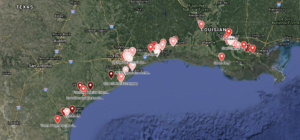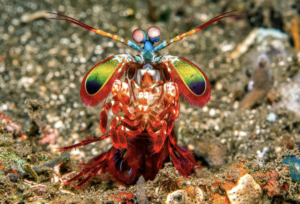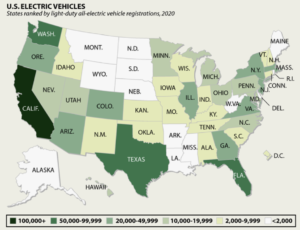While humans struggle to do the right thing for themselves and their fellow Earth travellers, animals act to save the world.
More helpful information about climate change for Scotty’s Scottish sojourn. Animals decide to save humanity. Giant redwoods and mountain ashes rapidly disappearing. Tesla blooms as EVs boom.
Climate champions speak with forked tongue
It is, of course, encouraging to see Boris Johnson and Joe Biden and their climate emissaries Alok Sharma and John Kerry working so diligently to persuade nations displaying climate action hesitancy to raise their game in Glasgow. You do, however, have to wonder just a little bit exactly how committed even the UK and USA are to the targets, strategies and changes that are really needed to abate global warming when you see what they’re up to at home. For example…
You’ve possibly never heard of the Permian Basin on the border between New Mexico and Texas but, as this 8-minute rapid-draw animation cleverly displays, it’s the world’s single most prolific oil and gas field. It produces 6 million barrels of oil per day, exceeded only by Russia (11 million) and Saudi Arabia (10 million). But fear not, the Basin is projected to increase production to over 10 million barrels per day by 2030, mostly for the US to export. Beyond the Basin, massive industrial development has occurred in Texas and along the coast of the Gulf of Mexico (see map of facilities below) to process and export the oil and gas. The video also highlights the economic, social and health consequences of the Basin’s development, not forgetting the environmental destruction and the well-named Permian Climate Bomb. And …
… across the Atlantic, the UK government is holding an enquiry into a proposed new coal mine in west Cumbria, next door to the Lake District. This would be the first new underground coal mine in the UK for 30 years. It’s a fair bet that the enquiry is principally a ruse to delay any decision until after the COP meeting and avoid international embarrassment for Boris. No surprise that there’s even an Australian link here with the Melbourne based EMR Capital holding the majority share in the hopeful mining company.
Pacific Islanders demand climate action
The Pacific Islands Climate Action Network (PICAN) is a network of civil society organisations working on climate change across Pacific Island countries. PICAN has seven top line messages to all the countries attending the COP26 in Glasgow:
- Keep fossil fuels in the ground. No new coal, oil or gas projects. Immediate end to fossil fuel subsidies. Everywhere!
- Commit to limiting global warming to 1.5 degrees Celsius. Sustained, radical and socially just cuts to emissions now, not later.
- Rich countries deliver the US$100 billion of financial assistance promised annually until 2025. Polluters to provide the trillions of dollars needed to create resilient Pacific communities.
- Financial and practical support needed to help Pacific people who are already suffering loss and damage to health and property from climate change.
- Gender justice is a precondition for climate, ecological and social justice.
- Pacific people will take legal and other action to protect human and environmental rights lost as a result of developed countries’ emissions.
- Do not marginalise the voices of Pacific Island peoples in climate negotiations at COP26.
As a sign of solidarity with Pacific Islanders, Kevin Rudd, Malcolm Turnbull and Bob Carr have combined forces and written to Pacific Island leaders encouraging them to press for ambitious action in Glasgow and criticising the Morrison government’s “cynical indifference” and “empty rhetoric”. Hell has no fury like a leader scorned.
To see ourselves as others see us. Damien Cave is the Australian bureau chief for The New York Times. Just before Scotty’s net zero by 2050 smoke and mirrors, Cave nicely summed up the impact of Australia’s climate inaction on our image overseas: “At a time when coal is being treated more like tobacco, as a danger wherever it’s burned, Australia increasingly looks like the guy at the end of the bar selling cheap cigarettes and promising to bring more tomorrow.”
I’m surprised that Morrison’s catchphrase for achieving net zero “the Australian way” hasn’t elicited any response from Coles who got there first with this appeal to chauvinism.
Animals decide to save humanity
A parallel Conference of the Parties, to which humans weren’t invited, has just finished (search “What the platypus could tell us about climate change”). At the human COP all the parties must reach consensus before anything is approved. But at the non-human COP, individual parties can make decisions that bind everyone. There were some interesting outcomes:
- The peacock mantis shrimp, which can see one million million million more colour hues than humans, decided to stop all burning of fossil fuels immediately so that its home on the Great Barrier Reef was not destroyed. Bad luck, Scotty;
- The great grey owl that can fly silently and hear a mouse hidden under snow 30 metres away in the Great Northern Forests of North America and Russia decreed that deforestation should end right now. Better get used to it, Justin … you too, Boris;
- The goliath catfish whose whole body is covered in taste buds that detect chemicals leaking from prey in the murky tributaries of the Amazon mandated the protection of Earth’s increasingly degraded freshwater systems. Suck it up, Jair.
My presentation of this story is, of course, an outrageous example of anthropomorphism. The shrimp, owl, catfish and platypus experience their worlds completely differently to the ways humans experience the world. A few years ago, I was introduced by Frans de Waal (“Are we smart enough to know how smart animals are?”) to the concept of “Umwelt”. This is the idea that every organism, because of its unique but always limited ways that it can perceive its environment, experiences a self-centred, subjective world that represents only a fraction of the worlds that are experienced by all the world’s species. Wittgenstein summed it up nicely, “If a lion could speak, we could not understand him”. This is not because the lion would speak Lion rather than English or Mandarin or Swahili but because the lion would be talking about needs, objects, challenges, activities, etc. that humans cannot begin to conceive. The lion’s experience of the world and of its life would be so totally alien to our own that it would be incomprehensible to us.
Giant trees disappearing
California and Oregon are famous for their giant Sequoias, or redwoods, which can grow up to 115 metres and live for thousands of years. But Australia has its giant trees also, particularly the Mountain Ash (Eucalyptus regnans) which lives for hundreds of years and can grow up to 100 metres. The Sequoia is a confer and doesn’t flower but the Mountain Ash, being a eucalypt, is the tallest flowering tree in the world. Giant trees are under great threat world-wide due to logging, deforestation and climate change which not only increases the temperature and the risk of fire but also alters rainfall and reduces mist which is an important component of some trees’ habitats. Tree climber Steven Pearce and ecologist Professor David Lindenmayer describe the beauty and benefits of Australia’s giant trees in this four-minute news report. Lindenmayer reveals the horrifying fact that Victoria has lost 77 per cent of its old growth forest in the last 20 years. What are our governments thinking?
EVs and Tesla booming
Sales of all-electric vehicles (EVs) are booming in the USA. Approximately 400,000 will be sold this year, 2.6 per cent of all new light duty car and truck sales (c.f., 1.6 per cent in 2020). Tesla rules the roost, capturing 70 per cent of the market. The geographic distribution is also extremely skewed. Of all light duty EVs on the road in 2020, 42 per cent were in California. The next five states on the list made up barely half of California’s total. The boom is expected to keep booming but Tesla will not continue to have all its own way as more manufacturers enter the market.
But Tesla’s current dominance of the EV sales henhouse just got even stronger. The company’s market value now exceeds US$1 trillion after Hertz placed orders for 100,000 Teslas (more than 20 per cent of its fleet), to be delivered by the end of 2022. To put the one trillion in perspective, that’s more than the combined market capitalisation of General Motors, Toyota, Ford, VW, BMW and Honda.
Regent honeyeaters released
Almost 60 captive-bred Regent honeyeaters have just been released in the Hunter Valley, NSW. With only 300 left in the wild, this constitutes a significant increase in their numbers. Much needed if the NSW government’s plans to raise Warragamba dam, mentioned last week, go ahead and destroy yet more of the honeyeater’s little remaining habitat.
Peter Sainsbury is a retired public health worker with a long interest in social policy, particularly social justice, and now focusing on climate change and environmental sustainability. He is extremely pessimistic about the world avoiding catastrophic global warming.







